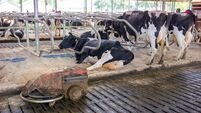Farm Finance: Four inflation-busting tips for your farm

Many mobile phone operators have 'yellow pack' variations of their offerings which are typically aimed at students but are equally applicable to any other customer.
Inflation is the buzzword presently. As farmers, we are also ultra-aware of it, especially so in relation to feed, fertiliser and fuel.
Price increases are also seeping their way into the typically less noticeable costs, such as the price of coffee, bread, confectionery, etc.












